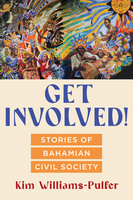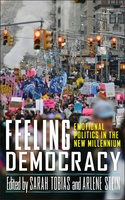
Bold Ideas, Essential Reading since 1936.
Rutgers University Press is dedicated to the advancement and dissemination of knowledge for a wide range of readers. The Press reflects and extends the University’s core mission of research, instruction, and service. They enhance the work of their authors through exceptional publications that shape critical issues, spark debate, and enrich teaching. Core subjects include: film and media studies, sociology, anthropology, education, history, health, history of medicine, human rights, urban studies, criminal justice, Jewish studies, American studies, women's, gender, and sexuality studies, LGBTQ, Latino/a, Asian and African studies, as well as books about New York, New Jersey, and the region.
Rutgers also distributes books published by Bucknell University Press.
Home Is Where Your Politics Are
Queer Activism in the U.S. South and South Africa
Get Involved!
Stories of Bahamian Civil Society
Feeling Democracy
Emotional Politics in the New Millennium
Cruel Destiny and The White Negress
Two Novels by Cléante Desgraves Valcin
Criminalized Lives
HIV and Legal Violence
Criminalized Lives profiles people charged in Canada with the crime of not disclosing their HIV-positive status to sex partners. Examining how criminalization disproportionately punishes poor, Black and Indigenous people, gay men, and women in Canada, Alexander McClelland investigates the consequences of criminalizing illness, which results in people being subjected to state violence rather than treated with care.
Brotherhood University
Black Men's Friendships and the Transition to Adulthood
American Anti-Pastoral
Brookside, New Jersey and the Garden State of Philip Roth
The Specter and the Speculative
Afterlives and Archives in the African Diaspora
The Specter and the Speculative
Afterlives and Archives in the African Diaspora
Wake
Why the Battle over Diverse Public Schools Still Matters
Wake: Why the Battle Over Diverse Public Schools Still Matters tells the story of the aftermath of the 2009 Wake County school board election in favor of "neighborhood schools," including the fierce public debate that ensued during school board meetings and in the pages of the local newspaper, and the groundswell of community support that voted in a pro-diversity school board in 2011. What was at stake in those years was the fundamental direction of the largest school district in North Carolina and the 14th largest in the U.S. Would it maintain a commitment to diverse schools, and if so, how would it balance that commitment with various competing interests and demands? Through hundreds of published opinion articles and several in depth interviews with community leaders, Wake examines the substance of that debate and explores the community’s vision for public education.








